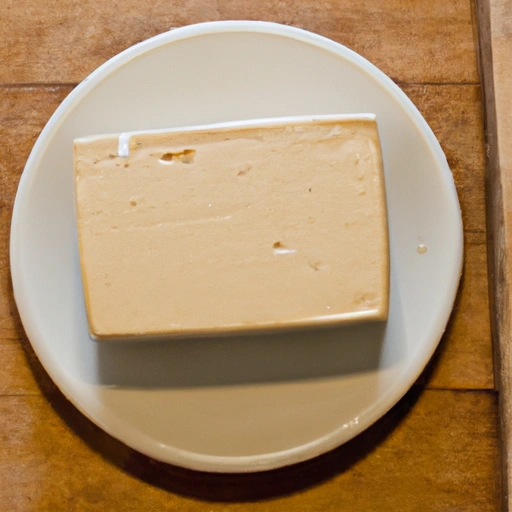Soy Cheese
Description

Soy cheese is a type of cheese substitute made from soybeans, a leguminous plant native to East Asia. A popular dairy-free alternative, soy cheese is designed to mimic many of the sensory characteristics of traditional cheese, including texture and flavor. Produced from soy milk—which is obtained by soaking, grinding, and boiling soybeans with water—it caters to individuals following a vegan diet, those with lactose intolerance, or anyone looking for a plant-based cheese option.
Common uses
Soy cheese is typically used as a direct substitute for dairy cheese. It can be found in a variety of forms including shredded, sliced, and spreadable. It is commonly used on pizzas, in sandwiches, and in salads, where it adds a cheesy flavor without the use of dairy. In addition, soy cheese is often used in cooking and baking, where it can be melted, grated, or incorporated into sauces.
Nutritional value
Calories
On average, soy cheese contains approximately 80 calories per 1-ounce serving (about 28 grams), making it a lower-calorie option compared to some traditional cheeses.
Protein
Soy cheese provides around 6 to 8 grams of protein per 1-ounce serving, contributing to its popularity as a protein-rich, dairy-free alternative.
Fat
The fat content in soy cheese can vary, but it generally contains about 4 to 6 grams of fat per 1-ounce serving, with a mix of saturated and unsaturated fats.
Carbohydrates
Most soy cheeses contain minimal carbohydrates, typically less than 2 grams per serving, making it suitable for low-carb diets.
Vitamins
Soy cheese may be fortified with vitamins such as Vitamin B12 and D, nutrients that are commonly found in dairy products but not naturally present in soy.
Minerals
It often contains minerals like calcium and phosphorus, which are sometimes added during manufacturing to enhance its nutritional profile.
Health benefits
As a plant-based food, soy cheese is cholesterol-free and low in saturated fat, which can be beneficial for heart health. The presence of soy protein contributes to muscle growth and repair, while the potential inclusion of isoflavones, phytoestrogens found in soy, may have positive effects on bone health and hormone balance.
Potential risks
Some individuals may be allergic to soy and should therefore avoid soy cheese. Additionally, concerns have been raised about the presence of phytoestrogens in soy and their potential impact on hormonal activity. It is important to consume soy cheese in moderation and as part of a varied diet.
Common recipes
Soy cheese is versatile and can be used in recipes such as vegan lasagna, dairy-free cheesecakes, and plant-based quiches. It can also be melted into soups and sauces or used as a topping for vegan tacos and burritos.
Cooking methods
While soy cheese can be used in similar ways to dairy cheese, it may melt differently. It is advisable to use low to moderate heat when attempting to melt soy cheese to avoid an undesirable texture.
Pairing with other ingredients
Soy cheese pairs well with traditional Italian and Mexican dishes, as well as with various fruits, nuts, and whole-grain bread for a balanced snack or meal.
Summary
Soy cheese is a nutritious, plant-based cheese substitute that offers a range of health benefits and versatility in the kitchen. Whether you're lactose intolerant, vegan, or exploring dairy-free options, soy cheese provides a protein-rich, lower-fat alternative to traditional dairy cheeses. Despite its potential benefits, it is important to be mindful of any food allergies and to incorporate soy cheese into a balanced diet.